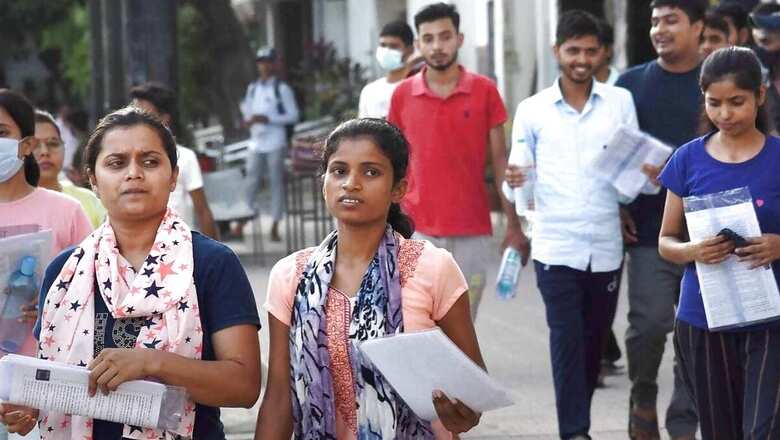
views
At least 35-40 per cent of sanctioned seats in engineering colleges across the country, most of which are privately-owned institutions, go vacant each year, with a large number of these remaining unfilled in rural and semi-urban areas, according to an analysis of data of the All India Council for Technical Education (AICTE).
As per official data, while 33 per cent of seats across undergraduate courses in these engineering colleges remained vacant in the 2021-22 academic session, the number of unfilled seats was a little over 44 per cent in the years 2020-21 and 2019-2020, respectively. The share of seats falling vacant in the pre-pandemic years was even higher — 48.56 per cent in 2018-19 and 49.14 per cent in 2017-18, respectively.
Also read| AICTE Launches Engineering Books in Marathi for Diploma, UG Courses
As per data, the number of students getting placed through these institutes, as against the number of those clearing the course each year has remained relatively low. While 2021-22 saw better campus placements in comparison to the previous four years, the numbers have otherwise remained low.
In 2021-22, 4,28,437 students got campus placements while 4,92,915 passed the course. In 2020-21, only 3,69,394 were placed against 5,85,985 clearing the course. The year 2019-2020 saw 3,97,740 students being campus placed against 6,48,938 having passed. Only 3,96,702 students got placed against 7,59,834 in 2018-19 while 3,43,834 were placed against 7,54,548 having cleared the course in 2017-18, as per data (the placement data is only of the campus placements).
Why do seats remain unfilled?
According to officials, the number of seats remaining vacant across colleges is a demand-and-supply situation with a large number of private institutions having opened engineering institutes but the courses being offered do not find as many takers. It is mostly core engineering courses such as civil, electrical, mechanical, and chemical, which are not getting as many takers, as most students want to study computer science, which also offers better job opportunities, in comparison to the core subject areas.
“While it’s true that takers for core engineering subjects saw a dip, in order to tackle the same, we have asked institutes to offer minors in emerging technologies such as AI, robotics, IoT, etc. along with it, so that they are able to find better avenues. Admissions in these branches have gone up over the past few years in comparison to the scenario previously. We have trained a large number of core engineering faculty members to teach in emerging technologies to boost core engineering,” a senior AICTE official told News18.com.
Of the seats falling vacant, more are found so in rural and semi-urban pockets, the official said, mainly because students want to migrate to metro cities, as there are issues with connectivity and infrastructure in general in these areas.
Concerned over the issue of vacant seats in engineering colleges, the AICTE 2018 constituted a committee headed by BVR Mohan Reddy, chairman of the Indian Institute of Technology (IIT), Hyderabad, to recommend short-term and medium-term prospective plans for these colleges. The committee recommended that no new engineering colleges be allowed to open up from 2020 and the situation be reviewed every two years. The moratorium was lifted in March this year.
Last year, the union ministry of education informed the Parliament that the filling up of seats in engineering institutes is dependent on the demand-supply situation which is dependent on the location of the institutes, academic and infrastructural facilities therein, and the placement opportunities.
Independent experts too said that the larger number of seats remaining vacant is those in core areas. Prof V Ramgopal Rao, group vice-chancellor, of BITS Pilani, said that it’s a demand and supply situation, the number of seats in these courses is higher than the takers. “The problem is seen more in rural areas mainly because of infrastructure issues and quality of teaching faculty, which translates into the quality of instruction with more students aspiring to join the college in metro cities,” he said.
What is being done about it?
Besides offering minors in emerging technologies to boost enrolment in core areas, AICTE officials said that they are translating course books into regional languages to address the language barrier seen in most students from rural and remote areas.
“We are working on making books available in regional languages for all courses that can be downloaded free of cost by students from the AICTE’s e-Kumbh portal. We expect students from rural areas to benefit largely from this. Their major fear coming to metros is a language barrier, as the course material is in English. Initially, we have taken up the translation of books in five core areas — civil, electrical, mechanical, computers, and electronics,” the official said.
Read| JEE Main 2023 Session 2 Results Likely to be Out Before April 30
For first-year students, he added, the work is complete and there have been more than a lakh downloads already over the past three to four months. “For second-year course books, 50 per cent of the work is done and this time we are ensuring that the authors are from the top tech institutes including IITs, NITs, and IIITs, among others,” the official said.
Officials said that the regulatory body plans to come up with a placement portal for engineering colleges in rural and semi-urban areas having tied up with industry partners for the same. “The portal is almost ready and might be launched now anytime soon,” the official added.
Read all the Latest Education News here



















Comments
0 comment